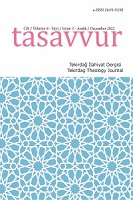Bilginin Mahiyetine Dair Tartışmaya On Altıncı Yüzyıldan Bakmak: Kutbüddîn elÎcî Örneği
Following the Debate on Essence of Knowledge in Sixteenth Century: The Case of Qutb al-Dīn al-Ījī
Author(s): Murat KaşSubject(s): History of Philosophy, Non-European Philosophy, Epistemology, 16th Century, Contemporary Islamic Thought, Ontology
Published by: Tekirdağ Namık Kemal Üniversitesi İlahiyat Fakültesi
Keywords: Kalâm; Philosophy; Knowledge; Essence; Categorical Status; Kutb al-Dīn al-Ījī;
Summary/Abstract: Islamic thought, no matter what tradition it belonged to, went through a process in which almost all thinkers after the twelfth century were also commentators of Avicenna (d. 428/1037). When this phenomenon combined with Fakhr al-Dīn al-Rāzī's (d. 606/1210) ability to problematize, his critical readings revealed the aporias and turned them into problems which would occupy the thinker’s mind after him and waiting to be solved. The quiddityof knowledge has an important place among these, both in terms of being closely related to many issues where ontology, epistemology and axiology intersect and being a problem area where the Islamic intellectual traditions’ conception of existence is directly reflected. As seen in the analyses of many thinkers, notably Râzî, the ontology, quiddity and category of knowledge in Avicennian philosophy contain elements that are conducive to encountering important challenges when the system as a whole is taken into consideration. Accordingly, scholars like Shams al-Dīn al-Isfahānî (ö. 749/1349), al-Taftāzānī (ö. 792/1390), al-Sayyid al-Sharīf al-Jurjānī (ö. 816/1413), Alî al-Qūshjī (ö. 879/1474), al-Dawwānī (ö. 908/1502), Sadr al-Dīn al-Dashtakī (ö. 903/1498) have taken the discussion to a further point both in terms of identifying the problem and revealing its implications and proposing solutions. This study aims to analyze the sixteenth-century thinker Kutb al-Dīn al-Ījī’s treatment of this problem who inherited the debates of past on the matter in question. He carries out his evaluations especially through the Alī al-Qūshjī (ö. 879/1474), al-Dawwānī (ö. 908/1502) and al-Dashtakī’s comments on the subject. He makes important contributions by analyzing these scholars’ solution offers concerning the problem of categorical status of knowledge and putting forward his own approach. He thinks that Alī al-Qūshjī’s distinction between realization (husūl) and subsistence (qiyām), al-Dashtakī’s theory of transformation and al-Dawwānī’s offer to not put the knowledge under the category of quality are problematic from various aspects.
Journal: Tasavvur Tekirdağ İlahiyat Dergisi
- Issue Year: 8/2022
- Issue No: 2
- Page Range: 751-779
- Page Count: 29
- Language: Turkish

